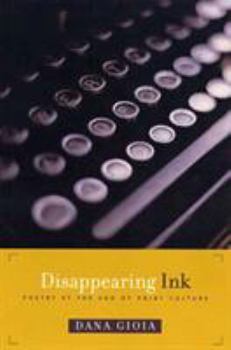Disappearing Ink: Poetry at the End of Print Culture
Select Format
Select Condition 
Book Overview
Leading poet Dana Gioia offers bold and insightful essays on poetry's changing place in contemporary US culture. With the clarity, insight and wit that made his 1992 work Can Poetry Matter? one of the... This description may be from another edition of this product.
Format:Paperback
Language:English
ISBN:1555974104
ISBN13:9781555974107
Release Date:October 2004
Publisher:Graywolf Press
Length:271 Pages
Weight:0.90 lbs.
Dimensions:0.8" x 6.1" x 9.1"
Customer Reviews
2 ratings
We're lucky to have this guy as the head of the National Endowment for the Arts
Published by Thriftbooks.com User , 17 years ago
I bought this book after attending a lecture by Mr. Gioia at the University of Texas. He impressed me with his courage in pointing out that Academic Intellectualism is killing poetry in America. He is a man with the courage of his convictions, a sensitive artist who hasn't lost his masculinity. We need more men like him. The book is a good reflection of the man. I think you'll like it... and him.
Intelligent, provocative, and well-reasoned.
Published by Thriftbooks.com User , 19 years ago
Ever since the publication of "Can Poetry Matter?" the essayist and Formalist poet Dana Gioia has been one of the most polarizing figures in the current literary world. The controversy around Gioia redoubled when he accepted President Bush's invitation to become chairman of the National Endowment for the Arts, causing more left-leaning poets to accuse him of "selling out." While I don't agree with everything Gioia says, and I'm certainly further to the left than he is, I think his opinions on the current state of poetry are never less than interesting and usually salutary. For instance, I couldn't agree more that poetry and music go well together on the same program, or that poets should mix their own work in public readings with favorite poems by others. Above all, Gioia has been a forceful advocate for poets in general and for the traditional craft of poetry in particular, and my hat is off to him for that. In "Disappearing Ink," his latest collection of essays, Gioia once again waves a red cape in the face of the academic establishment, banderilla at the ready. (Example: in the title essay, Gioia notes, "Attend an academic literary conference these days and you are more likely to hear, as I recently did, papers on the design of the Los Angeles freeway system as an expression of phallocentric power or gender-coding in breakfast cereal advertising than you are to find examinations of contemporary poetry.") The title essay, which discusses how the poetry scene is changing as the printed word gives way to the information highway, is a provocative yet common-sense examination of rap, cowboy poetry, performance poetry and other avenues poetry is taking toward survival in the 21st century. Gioia provides much reading pleasure in his discussion of various subjects, from the decline of San Francisco as an active literary center to the history of Italian-American poetry. He is at his most enjoyable when he comes to the defense of poets he admires, from misjudged classic poets (Longfellow, Frost) to underappreciated contemporary poets (John Haines, Samuel Menashe, Kay Ryan). He champions some poets you wouldn't expect him to defend, such as the late Jack Spicer, an openly gay San Francisco Bohemian who would be anathema to many in the Bush administration. His observations are nearly always astute, such as when he delineates the reasons why Elizabeth Bishop--whom he clearly reveres, but who doesn't really fit current poetic fashion--is a poetic god today: "During the bitterly divisive culture wars of the past quarter-century, Bishop could simultaneously appear on both sides of nearly every issue--the ally of both reformer and traditionalist, patron saint to both radical and reactionary--not to mention those beleaguered pilgrims traveling steadfastly in the middle of the road." Basically, Gioia just calls them the way he sees them, which is what a literary critic is supposed to do--except that too many have pulled their punches recently, to try and fit in





